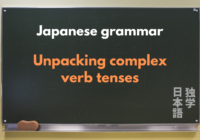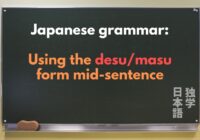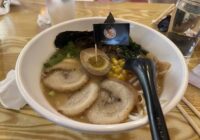Japanese grammar: Unpacking complex verb tenses
Japanese learner, is the JLPT right for you?
Japanese grammar: Summary of common verb tenses
Japanese vocabulary list: AI-related terms
The field of AI (more specifically generative AI) has seen amazing advances in the last few years, and AI is fast becoming a large part of many areas of our lives, including work, home, and even entertainment. While I cannot predict the exact time scale, it seems likely these types of technologies will continue to… Read More »
The dangers of using AI to learn Japanese grammar: a case of hallucinating ChatGPT
Japanese grammar: Using the desu/masu form mid-sentence
Japanese has a fairly complex set of ways to express politeness, but in terms of verbs there are two primary forms, the regular form and the polite form. The regular form includes the regular non-past or dictionary form, for example 食べる [taberu]. Other forms like the te-form (食べて [tabete]) are also considered to be non-polite.… Read More »
Travel Report: Vancouver, Canada (looking for Japanese stuff)
Recently I went on a family trip to Canada for a weekend, and while Japanese-related stuff wasn’t the primary focus, there was an element of that so I thought I would put a little travelogue here about it. From Portland it’s “only” a five or six hour drive. I guess the “only” part depends on… Read More »
Japanese restaurant review: “Ikimono Ramen” (in Portland)
I was in downtown Portland with my family and looking for some ramen, so we decided to try a relatively new ramen place called “ikimono Ramen”. Just judging from the name, already the place gave me a bad feeling (the name means “living thing” by the way, not sure what that means in this context),… Read More »









